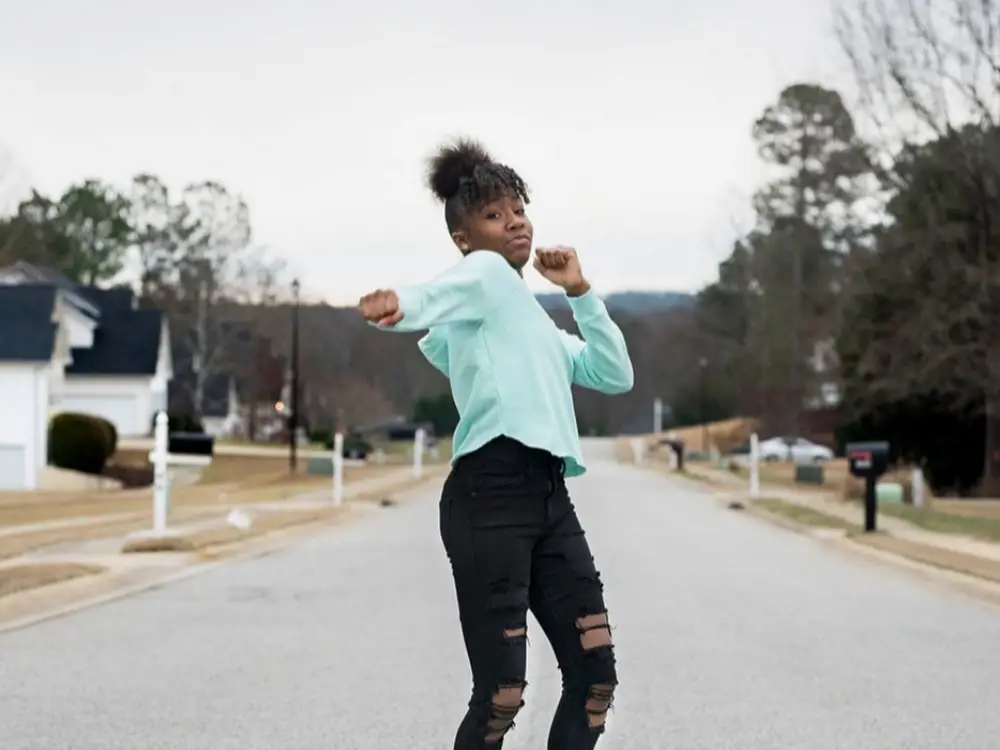The viral renegade dance is everywhere. Everyone from Lizzo to Kourtney Kardashian have recorded their own rendition of the dance popularized by K Camp’s “Lottery.” But only recently did its rightful creator get some much-deserved credit. Many on the internet rallied behind 14-year-old Jalaiah Harmon claiming that the success of the dance was stolen. Popular TikTok star Charli D’Amelio, who has 30 million followers, was, for a long time, given credit for popularizing the dance. However, there was no mention of the dance’s original creator until rapper K Camp and reporter Taylor Lorenz gave the teen credit in two separate twitter posts on Feb. 14.
In the following week, countless Twitter users spoke up about how Harmon was only given credit for her dance after months of fighting while other TikTok users were incorrectly assigned credit without even asking for it.
Harmon first uploaded the video of the dance to Instagram in September 2019. “I was happy when I saw my dance all over,” she told The New York Times. “But I wanted credit for it.”
By going without credit for so long, Harmon believes that she missed out on opportunities given to other TikTok users. “I think I could have gotten money for it, promos for it, I could have gotten famous off it, get noticed … I don’t think any of that stuff has happened for me because no one knows I made the dance,” she added.
With the renegade going viral on the scale that it has, it’s done nothing for Harmon and her career until now. In fact, the NBA invited TikTok stars Addison Rae and D’Amelio to perform the dance during the 2020 All-Star Weekend in Chicago, but there was no mention of the dance’s original creator being there with them. Following Twitter backlash, the NBA later invited Harmon to perform the dance on Sunday night’s All-Star Game.
https://www.instagram.com/p/B9AbpNrDTyT/
The original creator’s story brings up the greater issue that comes with viral internet content. Should viral trend creators receive credit for their content and what are the implications for those who don’t receive credit?
One might reference the case of Kayla Newman. The phrase “on fleek” went viral in the summer of 2014 when Vine user Kayla Newman, who went by Peaches Monroee on the app, uploaded the iconic vine coining the phrase. While both the video and the phrase did end up spreading all over social media, Newman herself was never really properly recognized for the viral trend she started. Because of this, she never made any money from the slang, while many others did.
Since going viral, “on fleek” has been featured in Ariana Grande lyrics, Forever 21 T-shirts and even IHOP’s Twitter account. Newman says she’s happy for the success of the phrase, but wishes she could have trademarked the word and gained a portion of the revenue companies got from using her creation to bolster their brands.
Newman’s story can be compared to the fate of Harmon’s. However, one difference between the two becomes clear when assessing intention. Newman, who didn’t have a large following on Vine to begin with, made up the phrase and posted the video because it was funny, but never imagined it becoming a phrase that countless people used in 2014. On TikTok, where simply recreating what is trending at the moment is the point, does giving original creators credit matter?
Those who believe viral creators should not be credited might point to the fact that TikTok dances are meant to be reproduced by others. It could be argued that since you can’t really trademark a dance then there aren’t really any ownership rights that come with creating one. Harmon created the dance, and then many others went on to co-opt and popularize it, but isn’t that the point anyway? She did not receive credit for creating the renegade dance until recently, but ultimately it did what she intended to do — it went viral.
However, with this virality comes a great deal of fame and attention — benefits that Harmon didn’t initially receive. It’s hard to quantify just how many followers or opportunities she missed out on because of this. Though a glimpse of it can be seen in the invitation of D’Amelio and Easterling to NBA All-Star Weekend.
D’Amelio and Easterling are popular TikToker users who have performed the dance countless times and helped popularize it. Their reward was to perform it on national television. Imagine the kind of recognition Harmon could have received had she been identified as the creator of the dance from the beginning.
From a moral standpoint, it seems it’s only fair that original creators of dances, even viral ones, get the credit they deserve. But this comes with a challenge. The first person to recreate any dance regardless of the platform it’s being uploaded on would have to tag or reference the creator in the dance.
https://www.instagram.com/p/B7jRtSsjuQ9/
But this becomes harder to do after the dance starts to pick up traction and becomes more popular. It becomes harder and harder to dig deeper into the corners of the internet to find who made the original when there are hundreds, even thousands, of videos of the same dance being posted. Meaning that if the first couple of people who post their own rendition of the song don’t credit the creator, it’s even less likely that the 100th person posting it will.
Maybe you ultimately believe viral creators should receive credit for their creations because at the end of the day they did make something that other influencers or corporations could benefit from. Or maybe you’re on the side that thinks that creating something and not receiving credit for it is really a consequence of starting a viral trend.
There is a middle ground that we may all be able to agree on: Out of decency, those who recreate these trends before they go viral should at least tag who made it to begin with. If this step isn’t taken, then it seems impossible that original creators will be able to get any sort of recognition after it’s gone viral. In fact, the careers of others who co-opted their creation might end up benefiting more than those of the original creators themselves.

















